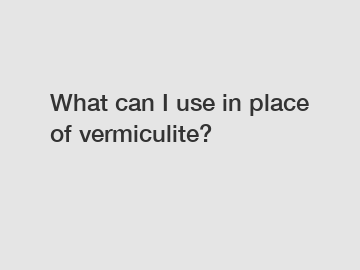What can I use in place of vermiculite?
Yayang contains other products and information you need, so please check it out.
What Can I Use in Place of Vermiculite?
Vermiculite is a popular ingredient used in gardening and horticulture for various purposes, such as improving soil drainage, aeration, and moisture retention. However, there may be situations where you don't have vermiculite available or prefer to seek alternative options. This article will explore some feasible alternatives to vermiculite that can be used effectively in gardening.

1. Perlite.
Perlite is one of the most common alternatives to vermiculite. It is a volcanic rock that has been heated and expanded, resulting in lightweight and porous granules. Perlite provides excellent drainage, aeration, and helps retain moisture in the soil. It improves soil structure and prevents compaction, promoting healthy root development. Perlite is widely available, affordable, and easy to use. Additionally, it is sterile and doesn't decompose or compact over time.
2. Coconut Coir.
Coconut coir, also known as coco peat or coco coir, is another great alternative to vermiculite. It is made from the fibers of coconut husks and serves as an excellent growing medium. Coconut coir is lightweight, retains moisture well, and has excellent water retention properties. It is pH-neutral, environmentally friendly, and can help improve soil structure. Coconut coir is available in various forms, such as blocks, bricks, or loose fibers.
3. Peat Moss.
Peat moss is a traditional soil amendment used for its ability to improve water retention and aeration. It is harvested from decomposed sphagnum moss and is commonly used to increase organic matter in the soil. Peat moss helps retain moisture, provides good drainage, and improves soil structure. However, it is important to be mindful of the environmental concerns associated with the mining and depletion of peat bogs.
4. Rice Hulls.
Rice hulls are an organic byproduct of rice processing and can be used as a substitute for vermiculite. They are lightweight, improve drainage, and help aerate the soil. Rice hulls also break down slowly, adding organic matter to the soil. They are an excellent choice for soil mixes that require increased drainage.
5. Compost.
Compost is a rich, organic material made by decomposing various plant and animal materials. It improves soil structure, enhances moisture retention, and provides essential nutrients to plants. Compost can be used to replace vermiculite when mixed with other components to improve drainage and aeration of the soil. Homemade compost is an environmentally friendly option that reduces waste and can be tailored to suit specific plant needs.
Closing paragraph:
These are just a few alternatives to consider if you are looking for a substitute for vermiculite. Each option offers its own unique benefits, so choose the alternative that best meets your gardening needs. Remember to adjust the recipe or ratio of the substitute material to ensure the soil mixture provides adequate drainage, aeration, and moisture retention for your plants. If you have any further questions or need more guidance, feel free to contact us.
Remember, contact us if you have any further questions or need more guidance.
Click here to get more.
Want more information on andalusite powder price per ton? Feel free to contact us.



